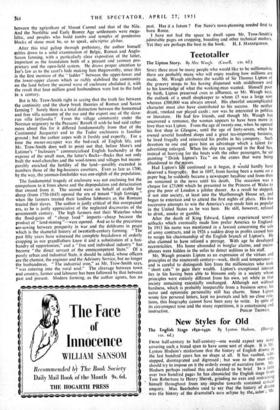Teetotaller
The Lipton Story. By Alec Waugh. (Cassell, rtl. 6c1.)
SINCE there must be many people who would like to be millionaires, there are probably many who will enjoy reading how millions are made. Mr. Waugh attributes the wealth of Sir Thomas Lipton of the grocery stores to his having dispensed with middlemen and to his knowledge of what the working-man wanted. Himself poor by birth, Lipton preserved even in affluence, so Mr. Waugh says, the outlook of a small shopkeeper to whom £5 was a large sum whereas £500,000 was always unreal. His cheerful uncomplicated character must also have contributed to his success. He neither drank, smoked nor played cards ; nor was he interested in politics or literature. He had few friends, and though Mr. Waugh has uncovered a romance, the woman appears to have been more in love than was Lipton. From the age of twenty-one, when he opened his first shop in Glasgow, until the age of forty-seven, when he owned several hundred shops and a great tea-importing business, he lived frugally and reinvested his profits in his company. Such devotion to one end gave him an advantage which a talent for advertising enlarged. When his ship ran aground in the Red Sea, instead of hurrying for the boats with the other passengers, he sat painting " Drink Lipton's Tea " on the crates that were being abandoned to thozwoves.
Had Lipton's fife continued as it began, it would hardly have deserved a biography. But in 1897, from having been a name on a paper bag; he suddenly became a newspaper headline and from then on remained in the news until his death. The occasion was a cheque for £25.000 which. he presented to the Princess of Wales to give the poor of London a jubilee dinner. As a result he stepped, if not into society, at least into the Marlborough House set, and began to entertain and to attend the first nights of plays. His five successive attempts to win the America's cup made him as popular in the United States as he was here. He still, however, refused to drink, smoke or gamble. After the death of King Edward, Lipton experienced several setbacks which eventually made him prefer America to England. In 1913 his name was mentioned in a lawsuit concerning the sale of army contracts, and in 1926 a sudden drop in profits caused him to resign his chairmanship of the English branch of Lipton's. He also claimed to have refused a peerage. With age he developed eccentricities. His home abounded in burglar alarms, and micro- phones were hidden in the sofas to detect sedition in his staff. Mr. Waugh presents Lipton as an expression of the virtues and principles of the nineteenth century—work, thrift and temperance— and is careful to distinguish him from the millionaires who took " short cuts" to gain their wealth. Lipton's exceptional interest lies in his having been able to blossom only in a society whose principles were entirely different from his own, yet while in that society remaining essentially unchanged. Although not without hardness, which is probably inseparable from a business sense, his naive and optimistic personality still has charm. Since Lipton wrote few personal letters, kept no journals and left no close rela- tions, this biography cannot have been easy to write. In spite of its circumspect tone and the many repetitions, it is entertaining and


































 Previous page
Previous page